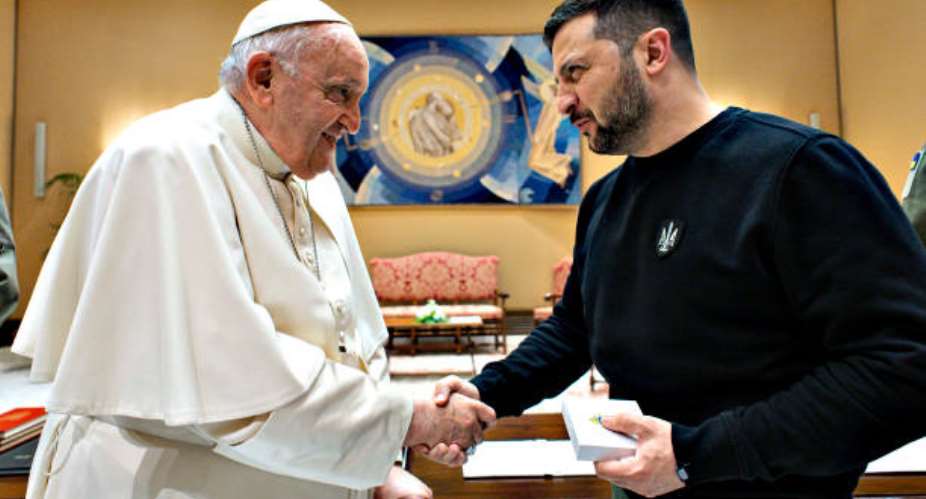In the face of global challenges, the need for moral leadership is paramount, and the recent comments by the Pope on the Russia-Ukraine conflict highlight the complexities surrounding the role of influential figures in fostering peace. While criticism has been directed at the Pope for his suggestion that Ukraine should negotiate with Russia, it is crucial to acknowledge the potential positive impact the Pope’s moral authority can have on facilitating a resolution to the conflict.
The initial criticism of the Pope centres on the perceived lack of proactive involvement when Russia amassed troops around Ukraine. It is essential to recognize that the Pope’s influence extends beyond direct political intervention. Instead, the Pope can play a significant role in diplomatic mediation, humanitarian assistance, international advocacy and the promotion of dialogue and reconciliation.
Addressing the immediate concerns, the Pope can utilize his moral and spiritual influence to encourage a peaceful resolution. Diplomatic mediation could be initiated, with the Pope acting as a neutral mediator between conflicting parties. This role would involve facilitating dialogue and negotiations, leveraging the Pope’s moral authority to encourage leaders to engage in peaceful discussions. The Vatican City could potentially serve as a neutral ground for diplomatic talks, or the Pope could send representatives to mediate discussions between Russian and Ukrainian officials.
Furthermore, the Pope can mobilize the Catholic Church’s vast resources to provide humanitarian aid to those affected by the conflict. This comprehensive assistance could encompass support for refugees, medical aid, and efforts to alleviate the suffering of civilians caught in the crossfire. Establishing a humanitarian fund within the Vatican to aid organizations working on the ground in Ukraine would demonstrate a tangible commitment to alleviating the humanitarian crisis.
The Pope’s global influence positions him to be a powerful advocate for peace within the international community. Engaging with world leaders, international organizations, and other religious figures can build a consensus for peace. Addressing the United Nations and urging member states to work collaboratively towards a diplomatic solution would showcase the Church’s commitment to supporting peacebuilding efforts.
Moreover, the Pope can foster dialogue and reconciliation not only among political leaders but also among religious and cultural communities affected by the conflict. By organizing interfaith meetings and emphasizing shared values and common humanity, the Pope can contribute to understanding and unity among diverse communities. These initiatives can promote lasting peace by addressing the root causes of the conflict and encouraging harmony on various societal levels.
In conclusion, the Pope’s role in addressing the Russia-Ukraine conflict extends beyond political intervention. By leveraging his moral authority and the resources of the Catholic Church, the Pope can contribute significantly to diplomatic efforts, humanitarian aid, international advocacy, and the promotion of dialogue and reconciliation. In doing so, the Pope can play a pivotal role in fostering a just and lasting peace amid the ongoing crisis.





 4,300 Liberians at Buduburam Refugee Camp to return home
4,300 Liberians at Buduburam Refugee Camp to return home
 Two dead in premix fuel depot explosion at Essikado-Ketan
Two dead in premix fuel depot explosion at Essikado-Ketan
 Driver of President Akufo-Addo convoy SUV dies in road crash
Driver of President Akufo-Addo convoy SUV dies in road crash
 Akufo-Addo's convoy in fatal crash
Akufo-Addo's convoy in fatal crash
 Mepe flood victims still in tents 8months after Akosombo Dam spillage
Mepe flood victims still in tents 8months after Akosombo Dam spillage
 Kpemka’s appointment as Deputy BOST MD is unconstitutional – Kwabena Donkor
Kpemka’s appointment as Deputy BOST MD is unconstitutional – Kwabena Donkor
 Voter registration: Two Togolese Nationals arrested in Buem for attempting to re...
Voter registration: Two Togolese Nationals arrested in Buem for attempting to re...
 DR Congo thwarts Kinshasa 'coup attempt': army
DR Congo thwarts Kinshasa 'coup attempt': army
 Media has made good progress in Ghana — Frema Opare
Media has made good progress in Ghana — Frema Opare
 Election 2024: NDC pledges to scrap betting tax, targets 80% youth support
Election 2024: NDC pledges to scrap betting tax, targets 80% youth support
